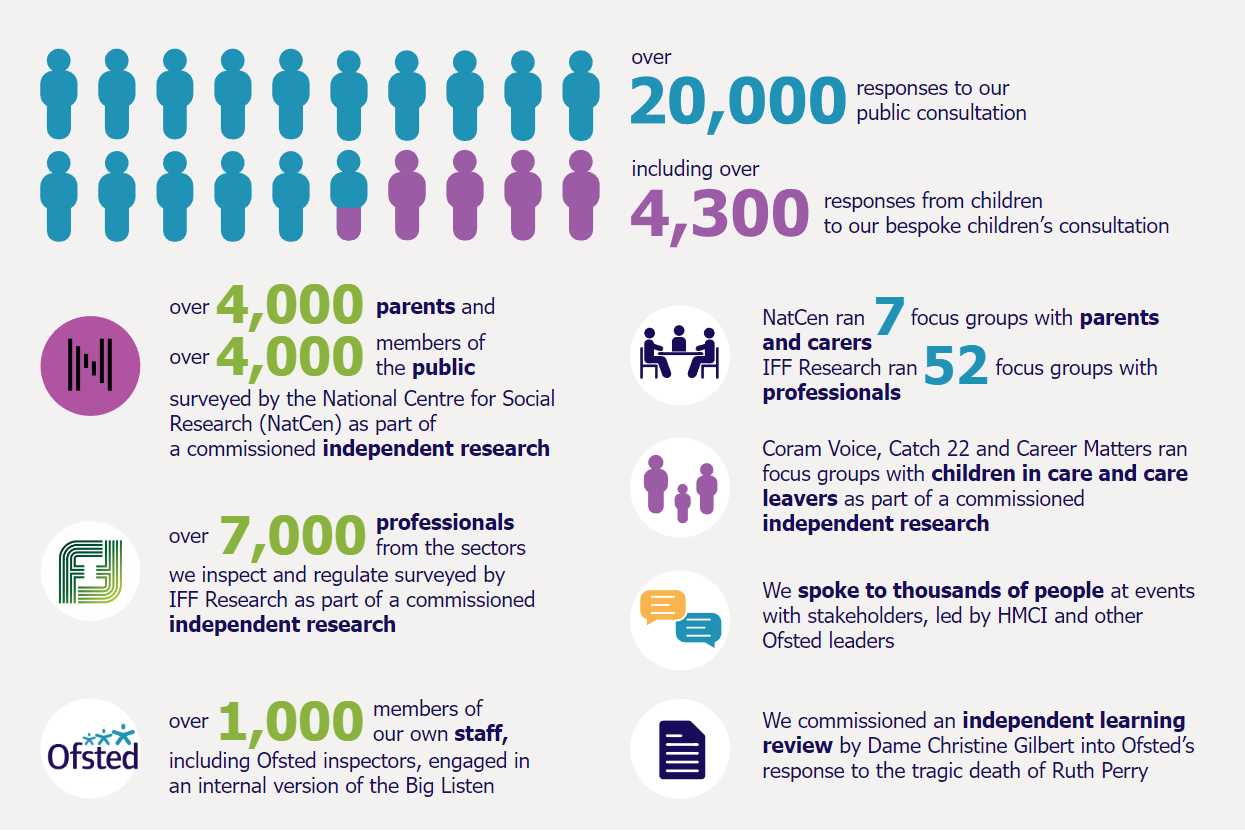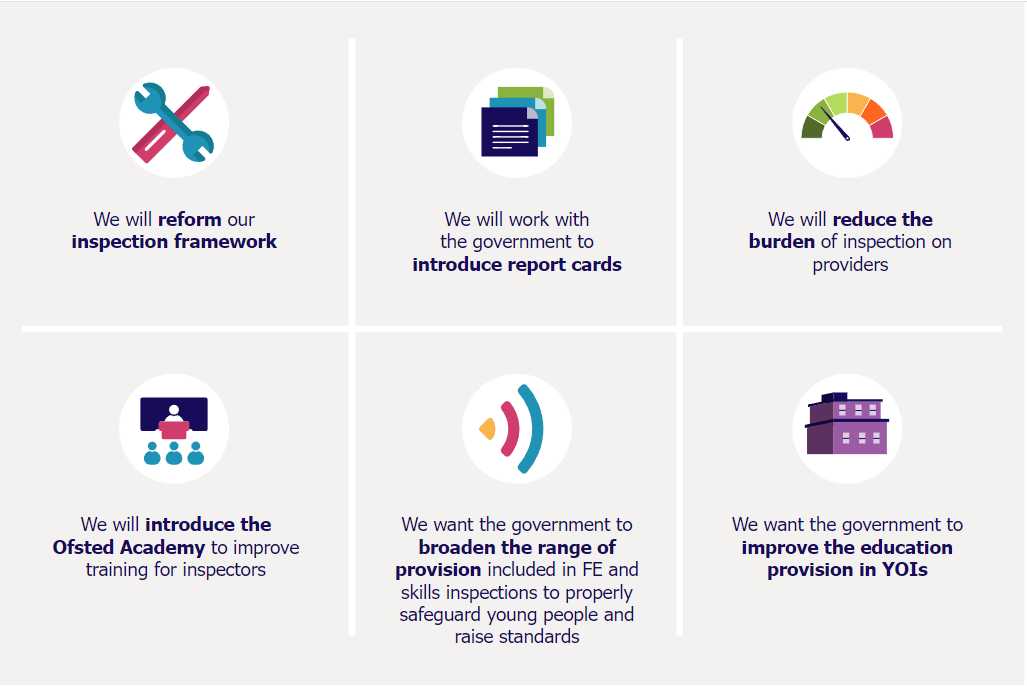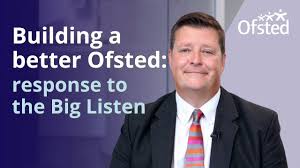“You have spoken, we have listened, and now it is time to act.”
September 2024: Ofsted published its largest-ever public consultation and set out a series of key changes in how it inspects education and skills providers. Several smaller changes were made to the EIF handbook for FE and Skills.
November 2024: Ofsted publishes Big Listen action monitoring report and announces trials of new inspection approach
February 2025: Ofsted began consultation on a new approach to inspecting education providers and the introduction of report cards.
The Big Listen Summary
The case for change
The 7 Cs
Ofsted condensed the Big Listen down to 7 core messages to help them respond to the challenges – the 7 Cs.
Click here to view the 7 Cs
1. Children and learners first – We heard from parents and carers that children and learners should come first, across all of our work. We agree. You will see from this response that everything we do is rooted in this commitment.
2. Care and well-being – We heard that inspectors should have more care and concern for the well-being of the leaders and staff we inspect. We have taken this on board. We will put it into practice through all the changes we are setting out here, from improving inspector training (including mental-health training) to reforming how we inspect.
3. Consistency of our inspections – We heard criticisms that many believe our inspections are carried out inconsistently. We also heard that our inspectors do not always have the necessary expertise or experience in the specific types of provision they inspect, or do not quite understand the context the provider is working in. This response will show how changes to inspector recruitment and training will help.
4. Content of our frameworks – We heard that our inspection frameworks do not always work as well as they could for some types of provider. This response will set out how we will tailor our frameworks to better suit different types of provider.
5. Complaints – We heard criticism of how we handle complaints, and about a lack of openness. This response will set out how we will improve our transparency and our complaints-handling processes.
6. Constructive feedback and reporting – We heard that inspection feedback should be more constructive, and that reports should have recommendations for improvement. We also heard that parents, carers and professionals all want more nuance in our reports, while still giving a clear assessment of quality. We agree. This response will explain how we will change our reporting to do this.
7. Consequences of our judgements – We heard frustrations from many of the professionals we inspect about the consequences of single-word judgements for overall effectiveness and the anxiety they cause. This response will set out how we will work with the government to change this.
The research and 6 key actions for FE and Skills
In Ofsted’s own words, this list explains how they plan to act to implement the changes.


“As set out in the ‘how we will change’ section, we will consult on a reformed inspection framework tailored to FE and skills. This will transform the process of inspection. The reformed framework will take account of the different contexts of providers and be tailored to the age of the learners, their stage of development and the nature of the provision.
We will consult on the framework later this academic year. This will include the size of our inspection teams and notice periods, to make sure these are proportionate for different types of providers.”
See video above
“We will work with the government to remove single-word judgements for overall effectiveness for FE and skills inspections. These will be replaced with a report card, which will be better tailored to different types of FE and skills provision. We will consult on what this looks like later this academic year.
We will have a sharper focus on outcomes, including providers’ contributions to meeting the skills needs.
We will consider how our inspections focus on how providers remove the barriers to opportunity for learners from disadvantaged backgrounds and those with SEND.
In the meantime, we will clarify how we will apply personal development and behaviour judgements from September 2024.”
“The ‘how we will change’ section sets out the details of the Ofsted Academy. This will transform how we recruit, train and develop all our staff, including improving our recruitment of inspectors from the FE and skills sector.”
“We will consult with the sector to make sure that our notice periods and the size of our inspection teams are proportionate to the size and complexity of the providers we inspect.
We have introduced a 5-day notice period for colleges and large and complex FE and skills providers. This received positive feedback in the Big Listen.”
“We will work with the government to make sure that provision for all learners, especially the most disadvantaged and vulnerable, is considered through our inspections of FE and skills providers.
Legislation currently does not allow us to inspect education for 14- to 16-year-olds delivered part-time in colleges (where the student is not a pupil registered at a school). These will often be some of the most disadvantaged and vulnerable learners, including those excluded from school, unaccompanied asylum seekers and home-educated learners. Six in 10 Big Listen respondents (64%) said we should be able to inspect this; 1 in 10 disagreed (13%).
We will call on the government to amend legislation so that Ofsted can inspect providers offering Higher Technical Qualifications. This is a major new skills qualification. We should inspect these providers, who spend public money, so that they are accountable and standards are high. Over half (61%) of respondents said we should be able to inspect them. About 1 in 7 disagreed (15%).”
“We will soon publish our findings from a review of YOIs, which we carried out jointly with His Majesty’s Inspectorate of Prisons (HMIP). Children and young people in YOIs are some of the most vulnerable that we encounter through our work. Getting their education right is fundamental to their rehabilitation and to helping them have successful lives in the future.
The review found a pattern of decline in the quality of education in YOIs. Teachers are not able to manage behaviour. Young people are not getting access to the education they need. This is reinforced by our Big Listen children’s consultation, which found that some young people in YOIs did not get the support they needed. The review will make recommendations, including to the Ministry of Justice, to improve education for children held in YOIs.”
We have created a PDF resource outlining the 6 key changes here.
Mesma will help you to be ready for the changes
We empower providers to be confident in their QA practices and free them to focus on the improvements that matter most to their learners.
We keep Mesma software and resources aligned with the latest updates to quality standards, including the Education Inspection Framework. We provide up-to-date resources that support you and your colleagues in developing quality skills, ensuring you stay ahead of the curve.
As we move into the autumn season providers focus on self-assessment and/or quality improvement planning. To support you in this vital process, we are pleased to share the recording of our recent webinar, Self-Assessing for Brilliantly.
In this session, Lou Doyle provides actionable insights into adopting a “no surprises” approach to inspection readiness, regardless of the quality framework or regulatory requirements you are working towards.
Get in touch for a Mesma demo or to talk to us about how Mesma can support you.





